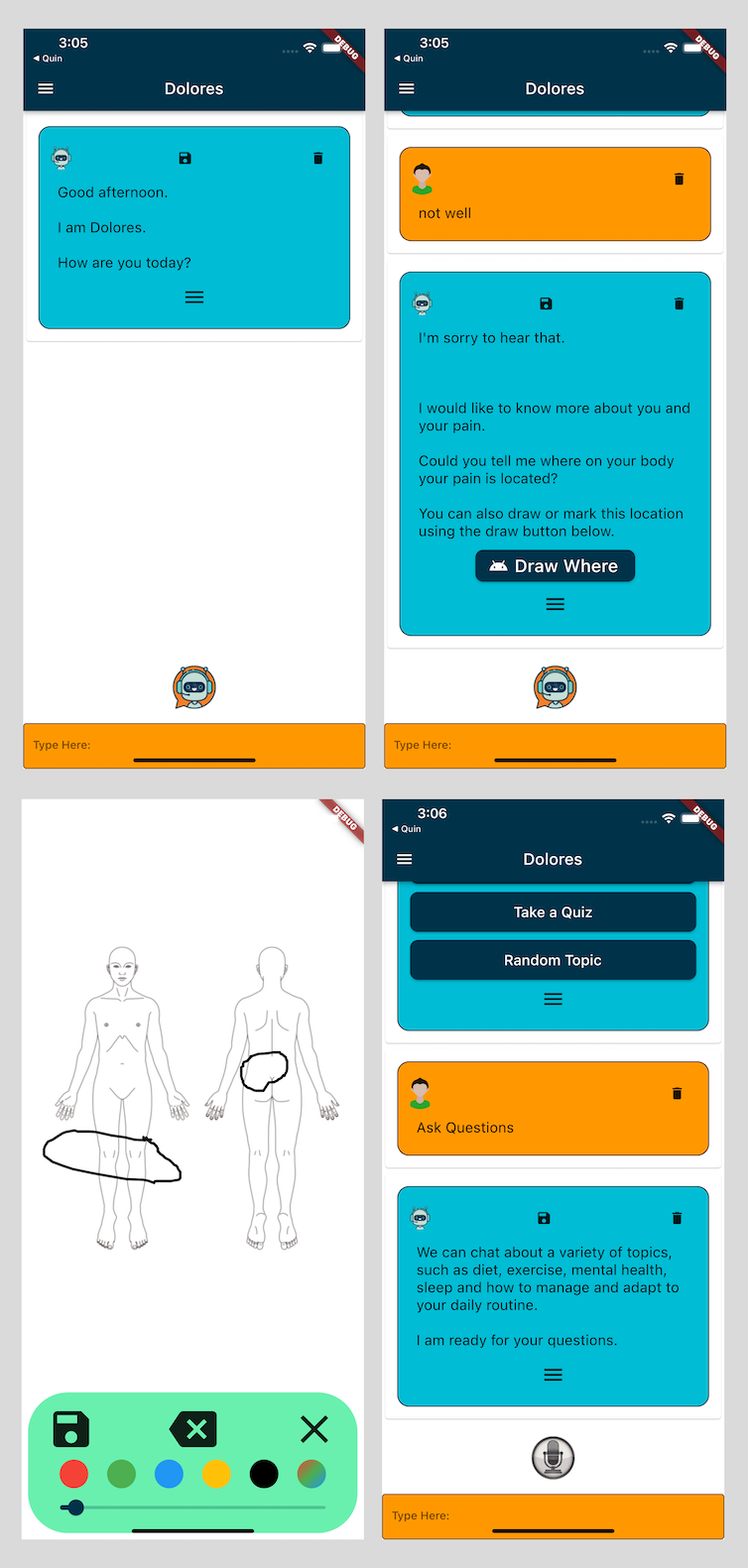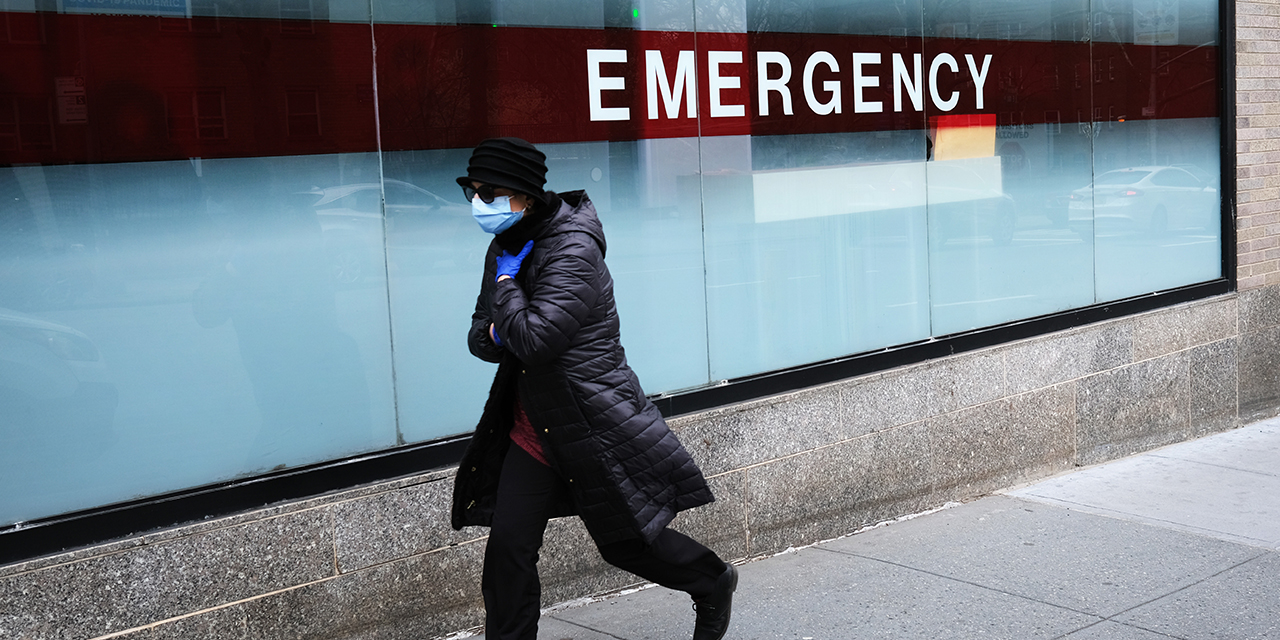
As the coronavirus outbreak continues to unfold in the United States, Americans have grown increasingly concerned by the threat posed to the country’s population, economy and personal finances. This analysis focuses on perceptions of international threats to the U.S., including views of the threat posed by the spread of infectious diseases. Many of these questions have been asked previously, including in the U.S. in 2019 and globally in 2018. The analysis also includes Americans’ views of international cooperation on many of the same threats facing the global community, including the spread of infectious diseases.
For this report, we used data from a survey of 1,000 U.S. adults conducted over the phone from March 3-29, 2020.
Here are the questions used for the report, along with responses, and the survey methodology.
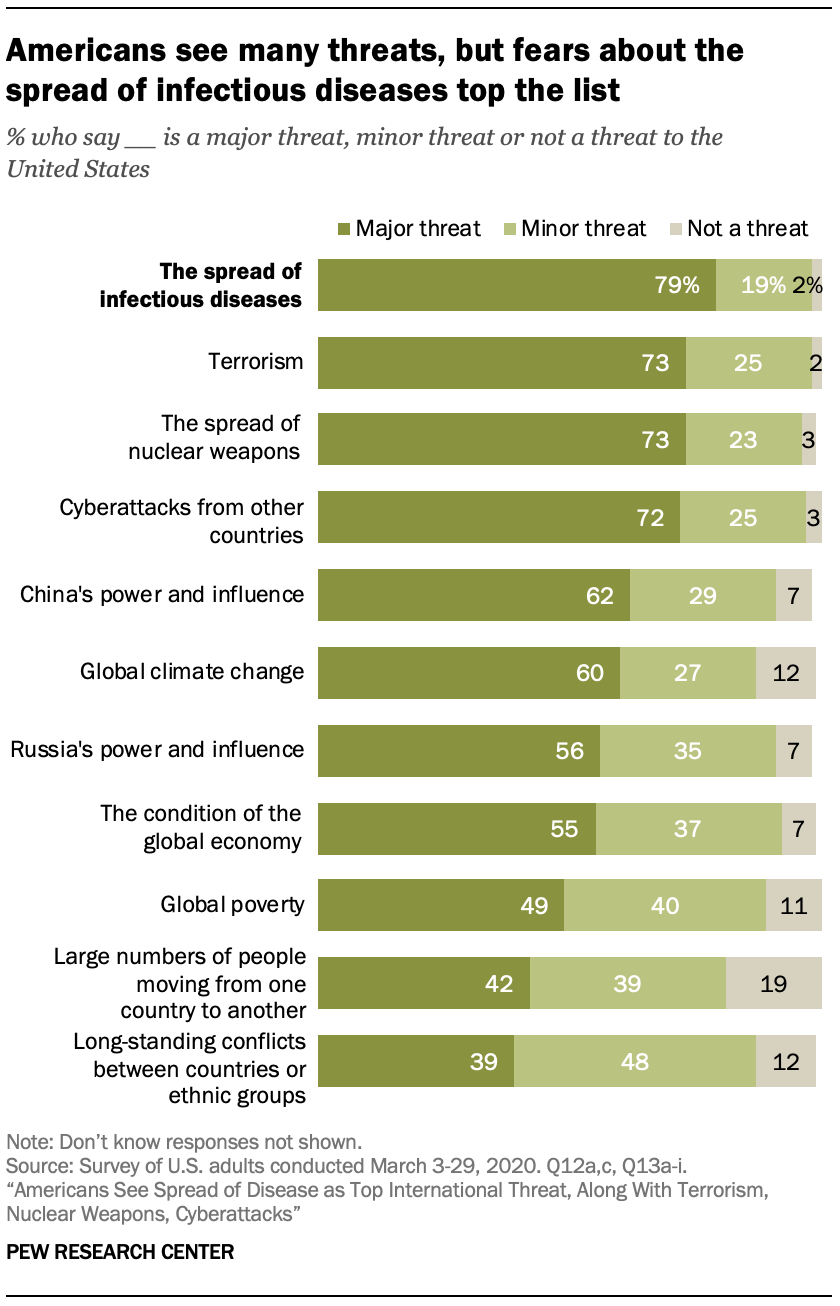 Americans continue to see many international issues – including terrorism, the spread of nuclear weapons and cyberattacks – as major threats to the well-being of the nation. But as the COVID-19 pandemic sweeps the globe, the greatest threat named by Americans in a March 3-29 Pew Research Center survey is the spread of infectious diseases.
Americans continue to see many international issues – including terrorism, the spread of nuclear weapons and cyberattacks – as major threats to the well-being of the nation. But as the COVID-19 pandemic sweeps the globe, the greatest threat named by Americans in a March 3-29 Pew Research Center survey is the spread of infectious diseases.
Nearly all U.S. adults (98%) say this is at least a minor threat, with roughly eight-in-ten (79%) naming outbreaks of disease as a major threat to the country. This is 27 percentage points higher than the level of concern about infectious disease in the midst of West Africa’s Ebola outbreak in 2014.
But infectious disease is not the only issue where Americans see a growing threat. Concerns about China and the condition of the global economy have also been on the rise. The survey, conducted at a time of surging COVID-19 cases in the United States, found that worries about both the threat of infectious diseases and the condition of the global economy rose after President Donald Trump declared a national emergency on March 13.
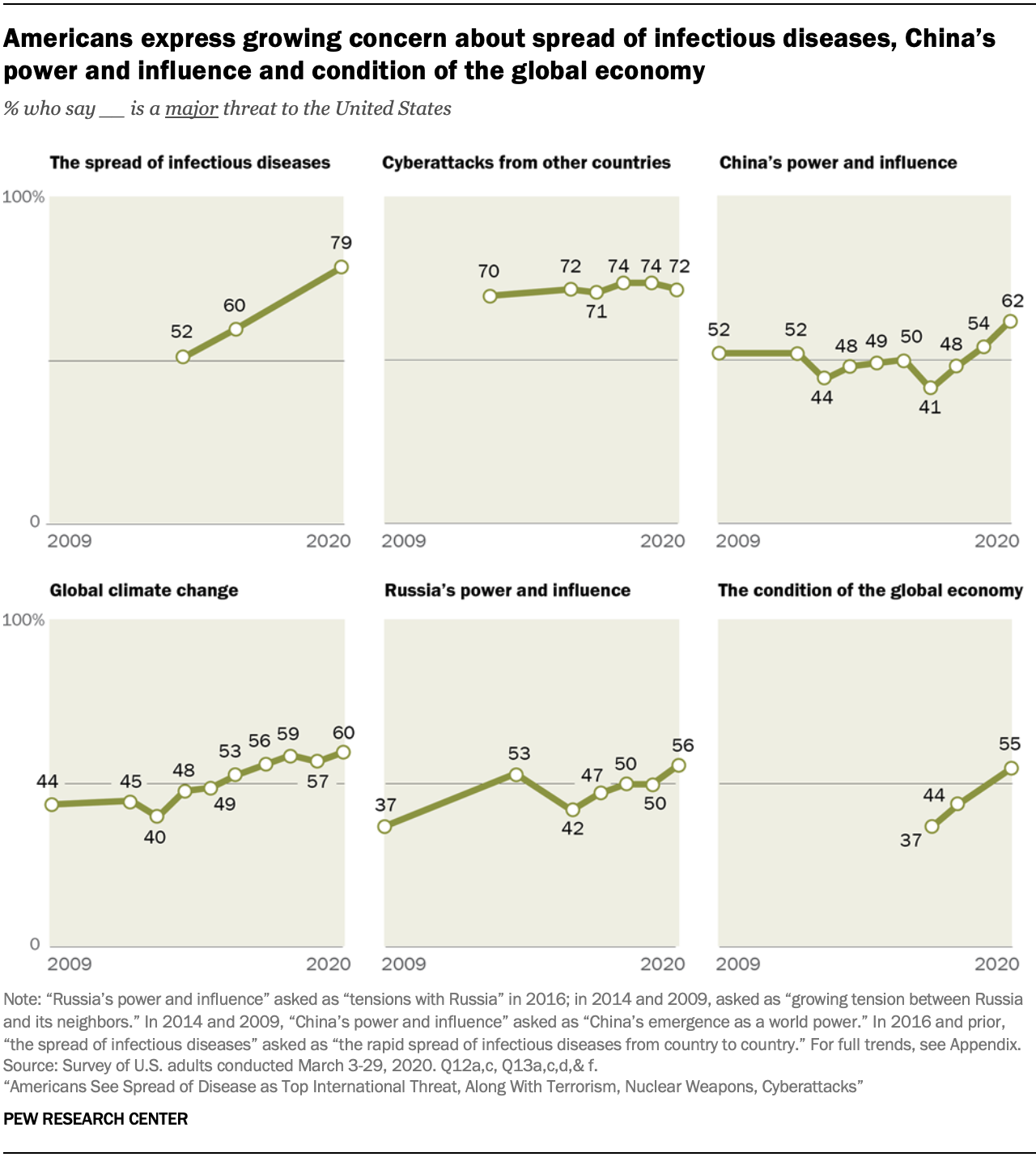
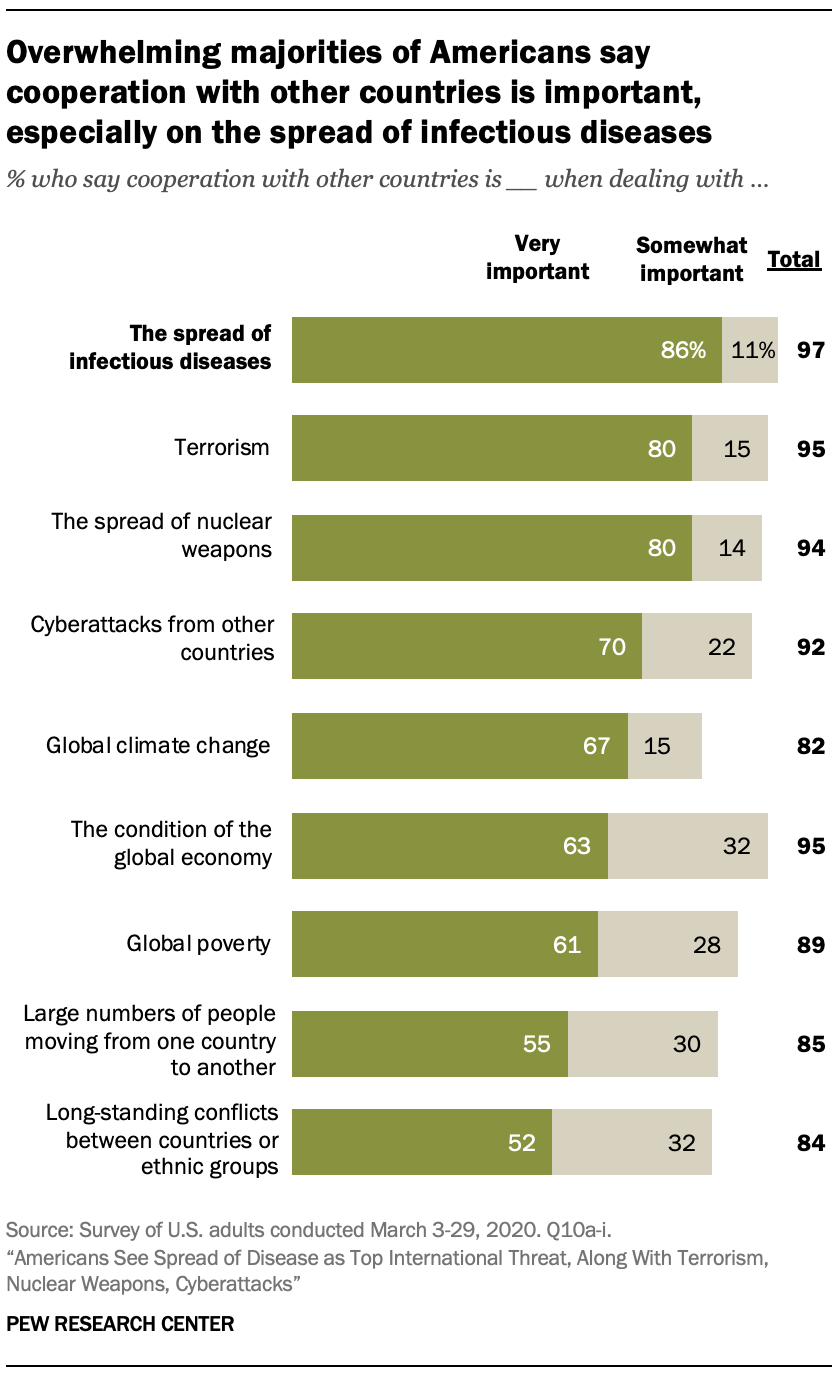 Overwhelming majorities of Americans say cooperation with other countries is important when dealing with each of the international issues tested, and this is especially true of the spread of infectious diseases. On this issue, 86% say it is very important to cooperate with other countries, and 97% say it is at least somewhat important to cooperate.
Overwhelming majorities of Americans say cooperation with other countries is important when dealing with each of the international issues tested, and this is especially true of the spread of infectious diseases. On this issue, 86% say it is very important to cooperate with other countries, and 97% say it is at least somewhat important to cooperate.
The new strain of coronavirus is thought to have originated in Wuhan, China. The past year has seen tensions between Beijing and Washington on a number of topics, including the current pandemic, trade and economic issues. Roughly six-in-ten Americans (62%) name China’s power and influence as a major threat, a figure that has increased sharply in recent years. By comparison, in 2017, 41% said China was a major threat to the U.S.
And as the economic fallout from the COVID-19 crisis becomes clearer, Americans increasingly see the condition of the global economy as a threat. Since 2017, concerns about the state of the world economy have risen 18 percentage points, from 37% saying it was a major threat in 2017 to 55% who say so today.
A majority of Americans also see global climate change and Russia’s power and influence as major threats, although stark partisan divides characterize each of these issues.
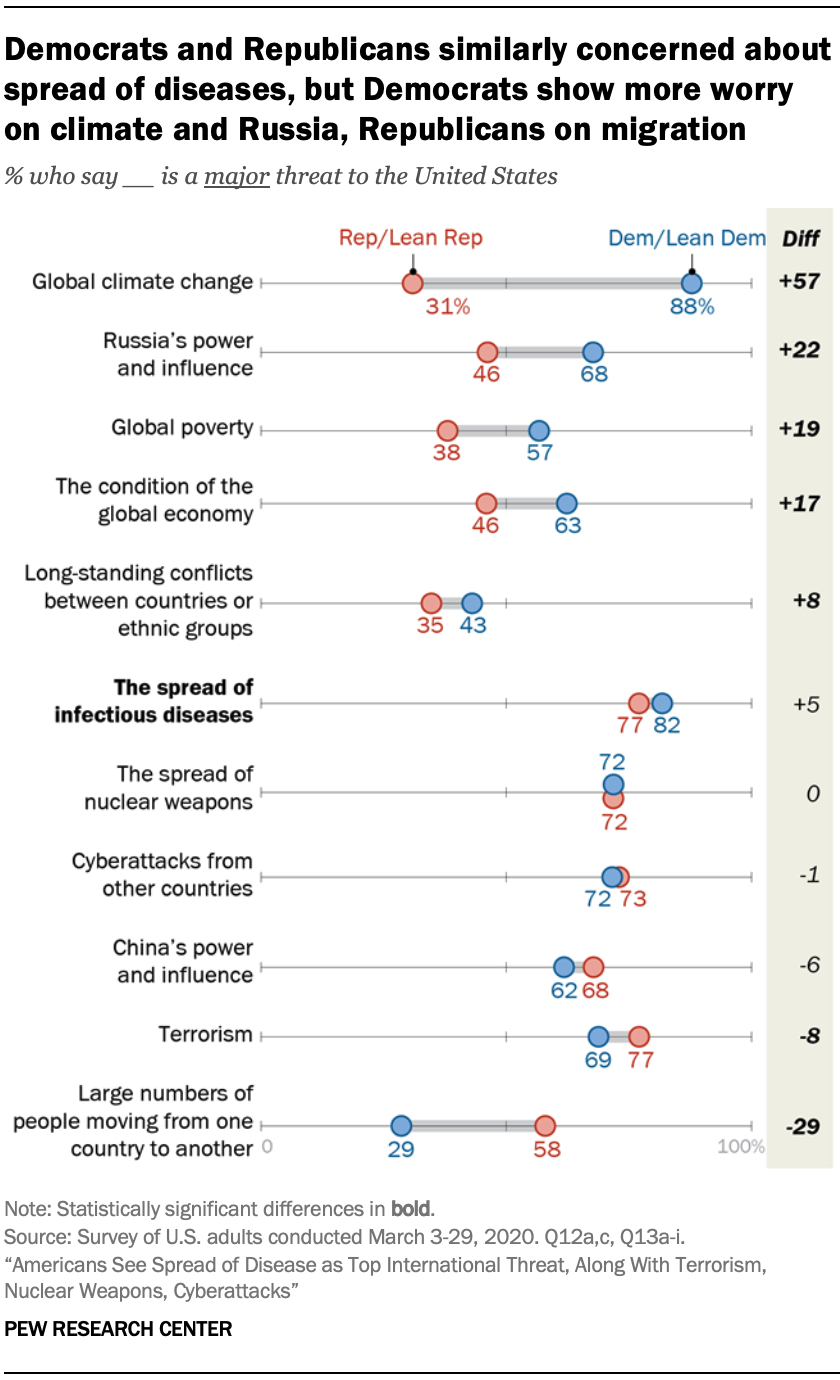 In general, Democrats and Democratic-leaning independents tend to be more concerned than Republicans and Republican-leaning independents about each threat tested on the survey. But this is especially true on the threat of climate change, where there is a 57 percentage point difference between the shares of Democrats (88%) and Republicans (31%) calling climate change a major threat. Partisan differences of this nature are seen on other issues tested, including Russia’s power and influence (Democrats are 22 points more likely to say this is a major threat), global poverty (19 points) and the condition of the global economy (17 points).
In general, Democrats and Democratic-leaning independents tend to be more concerned than Republicans and Republican-leaning independents about each threat tested on the survey. But this is especially true on the threat of climate change, where there is a 57 percentage point difference between the shares of Democrats (88%) and Republicans (31%) calling climate change a major threat. Partisan differences of this nature are seen on other issues tested, including Russia’s power and influence (Democrats are 22 points more likely to say this is a major threat), global poverty (19 points) and the condition of the global economy (17 points).
Republicans, however, are more concerned about the large numbers of people moving or migrating from one country to another and terrorism than are Democrats.
Democrats and Republicans are equally concerned about the threat of disease, and this was largely true in 2014 and 2016 as well.
Roughly half of Americans or fewer are very concerned about global poverty, migration and long-standing conflicts between countries or ethnic groups. Still, majorities name these as at least minor threats.
These are among the major findings of a Pew Research Center survey of 1,000 U.S. adults conducted by telephone from March 3-29, 2020. The survey took place as COVID-19 spread across Asian and European countries, and then across the U.S. During the fieldwork period, President Trump declared a major national emergency and the economy endured major shocks, including plummeting stock prices; the closure of many retail, travel and food sectors; and a major drop in the price of oil.
Concern about disease threat high among all Americans, but especially those with less education and lower incomes
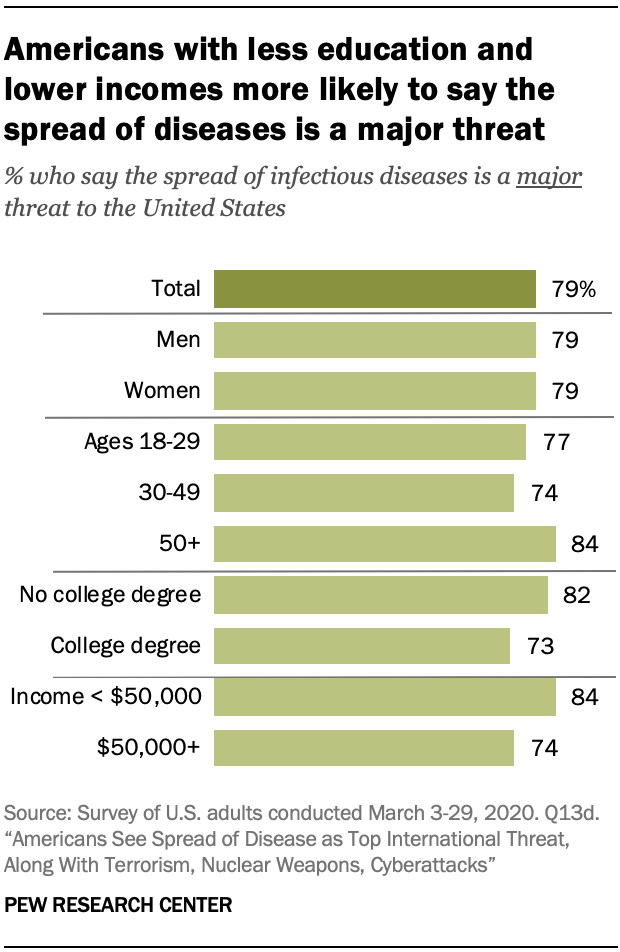 With most Americans worried about the spread of infectious disease, differences among demographic groups are relatively narrow. Still, some groups register particularly high levels of concern.
With most Americans worried about the spread of infectious disease, differences among demographic groups are relatively narrow. Still, some groups register particularly high levels of concern.
For example, Americans with less than a college degree are 9 percentage points more likely to be concerned about the threat of infectious disease than those who have a college degree or more education. Similarly, those who have incomes of less than $50,000 per year are 10 points more concerned about the threat posed by infectious diseases than those with higher incomes.
Worries about the spread of disease intensified through March
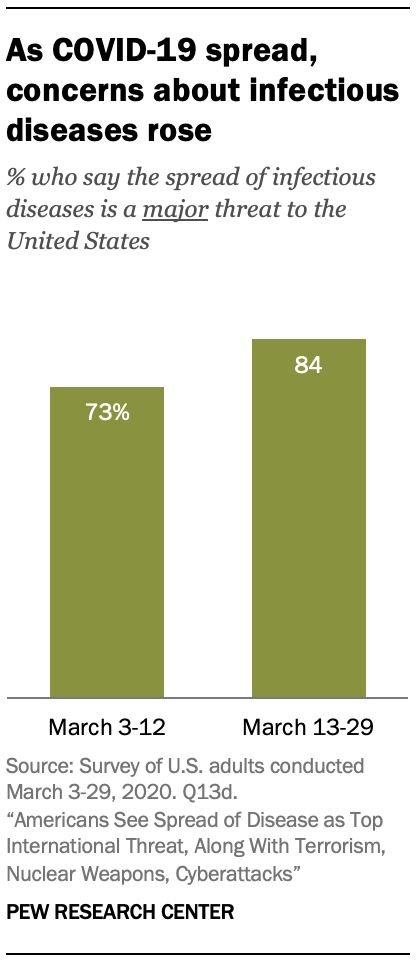 As the COVID-19 outbreak developed across the country, concerns about the threat posed by the spread of infectious diseases grew rapidly as well.
As the COVID-19 outbreak developed across the country, concerns about the threat posed by the spread of infectious diseases grew rapidly as well.
Among respondents who took the survey from March 3-12, before the declaration of a national emergency and the suspension of most professional and collegiate sports seasons, 73% said the spread of infectious diseases was a major threat. But once the declaration was made on March 13, as cases of the novel coronavirus increased across the U.S., more became concerned about the issue. Among those surveyed between March 13-29, 84% named spreading disease as a major threat.
Concerns about the condition of the global economy and global poverty also saw increases during the field period. About halfway through the dramatic slide in stock market prices from March 3-12, 48% of Americans saw the condition of the global economy as a major threat. But between March 13-29, as businesses began to close due to the crisis and Italy went into lockdown, major concern about the global economy rose to 60%.
Infectious disease, terrorism, nuclear weapons and cyberattacks are top concerns
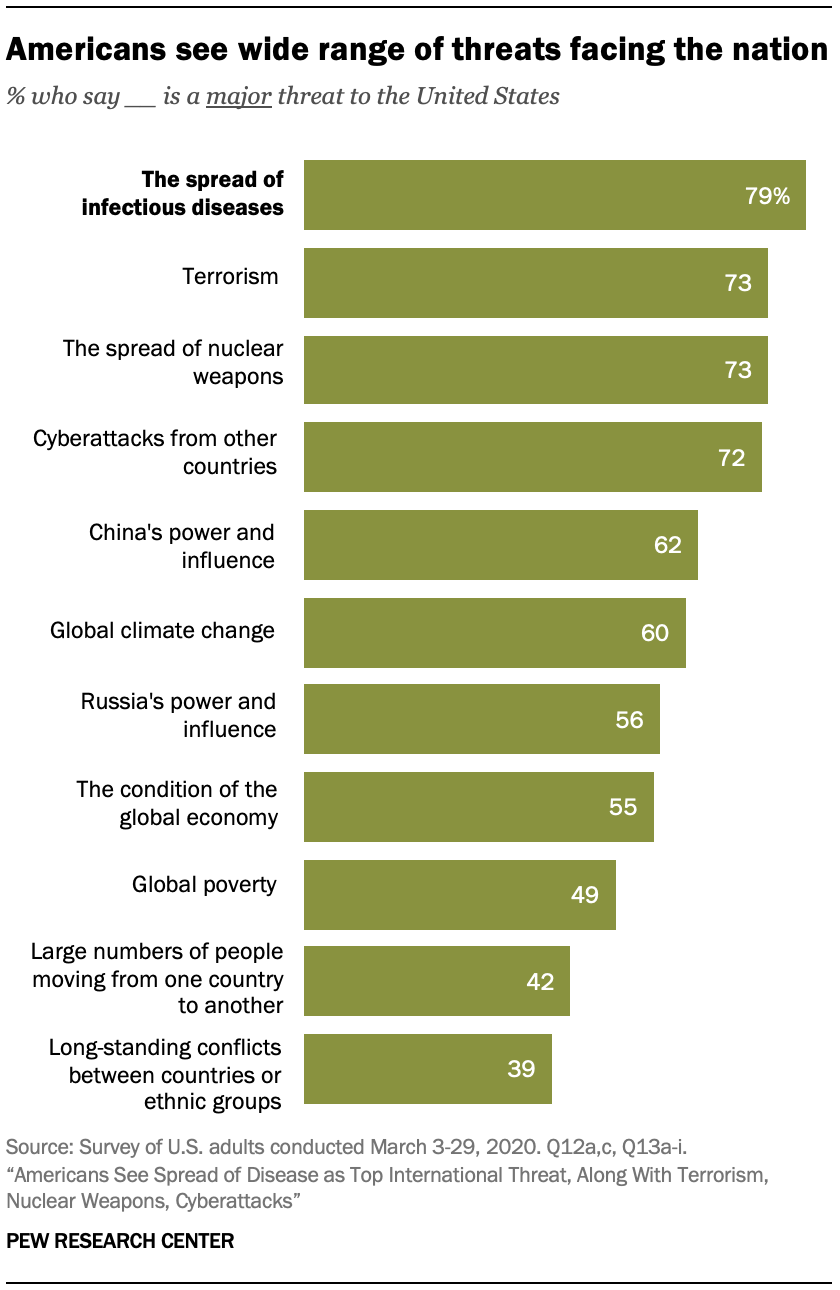 Americans are most likely to consider the spread of infectious diseases as a major threat to the nation. However, majorities rate eight out of the 11 threats tested on the survey as major threats.
Americans are most likely to consider the spread of infectious diseases as a major threat to the nation. However, majorities rate eight out of the 11 threats tested on the survey as major threats.
At least seven-in-ten Americans also name terrorism, the spread of nuclear weapons and cyberattacks from other countries as major threats to the U.S.
Only about four-in-ten Americans say that large numbers of people moving from one county to another or long-standing conflicts between countries or ethnic groups pose major threats to the country.
Nearly one-in-five (19%) say the movement of people is not a threat, the largest share across all threats included in the survey.
Older Americans more likely to see major threats, except in case of climate change
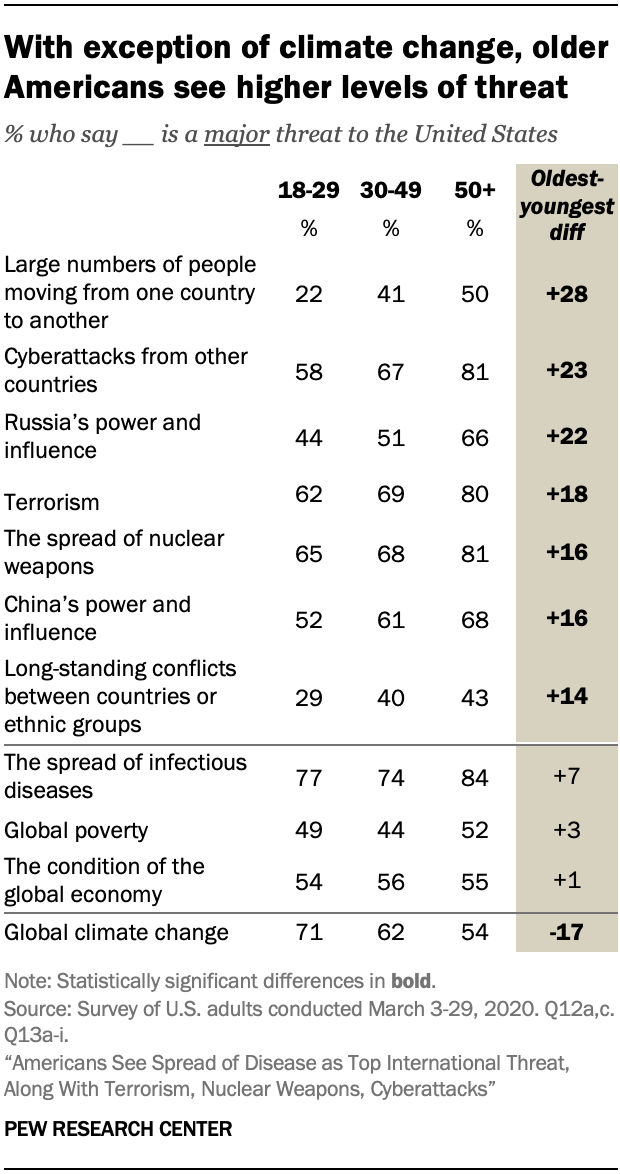 Across most of the international issues tested in the survey, older Americans express greater concern than those in younger age groups.
Across most of the international issues tested in the survey, older Americans express greater concern than those in younger age groups.
The difference is largest on the issue of migration: Half of those ages 50 and older say the large numbers of people moving from one country to another is a major threat, compared with 22% of those ages 18 to 29. Large gaps are also seen between older and younger Americans on the threats posed by cyberattacks, Russia, terrorism, nuclear proliferation, China and long-standing international and ethnic conflicts.
The reverse is true on the issue of global climate change: Younger Americans are more likely to say this is a major threat compared with their older counterparts. About seven-in-ten (71%) 18- to 29-year-olds say climate change is a major threat, compared with 54% of Americans 50 and older.
More now say climate change is a major threat
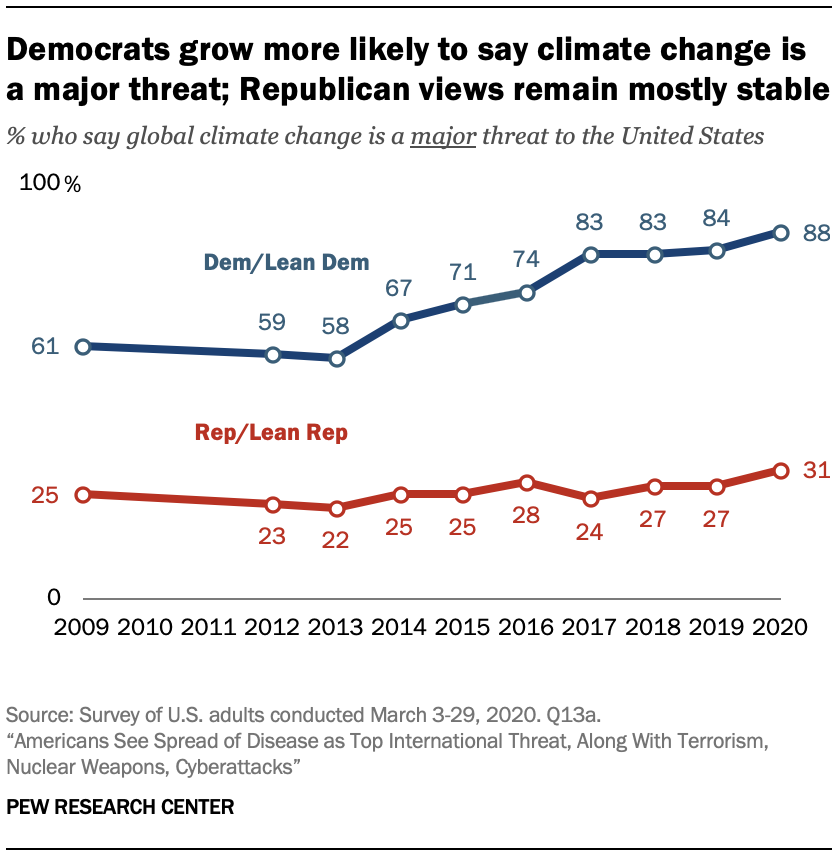 The belief that climate change is a major threat has increased steadily in the United States over the past seven years. Six-in-ten Americans see climate change as a major threat to the country today, up from a low of 40% who said the same in 2013.
The belief that climate change is a major threat has increased steadily in the United States over the past seven years. Six-in-ten Americans see climate change as a major threat to the country today, up from a low of 40% who said the same in 2013.
Views of climate change have been consistently partisan over the past decade. Now, Democrats and Democratic-leaning independents are more than twice as likely to say climate change is a major threat than Republicans and Republican-leaning independents (88% vs. 31%). The share of Democrats who believe climate change is a threat has risen from 61% in 2009, while Republican views on this issue have remained relatively steady.
Democrats are also more likely than Republicans to say Russia’s power and influence poses a major threat. Nearly seven-in-ten Democrats and Democratic-leaning independents (68%) said this of Russia, compared with 46% of their Republican counterparts, a difference of 22 percentage points. This partisan difference has been consistently wide since Trump’s election; before that, partisan views of Russia were less pronounced and mostly moved in tandem.
Americans generally favor international cooperation to counter threats, but partisan divides persist
Americans overwhelmingly say that cooperation with other countries is important when dealing with major international threats. This is especially true on the preeminent international issue of early 2020, the spread of infectious diseases. Here, 86% say it is very important to cooperate with other countries when dealing with disease outbreaks, and fully 97% say it is at least somewhat important to cooperate.
Indeed, an overwhelming majority of Americans think cooperation with other countries is important for dealing with all the major international issues polled. But there is variation on whether people say cooperation is very important. For example, eight-in-ten Americans say cooperation on terrorism and the spread of nuclear weapons is very important, compared with only 55% and 52%, respectively, who do so on the issues of migration and long-standing conflicts between countries.
However, Americans are more likely to say these major issues require cooperation than they are to say they see them as threats. When comparing whether these issues are seen as major threats and whether cooperation to deal with them is very important, Americans tend to be more likely to say they require cooperation. For example, 55% of Americans see cooperation with other countries as very important for dealing with migration, but only 42% of Americans see migration as a major threat.
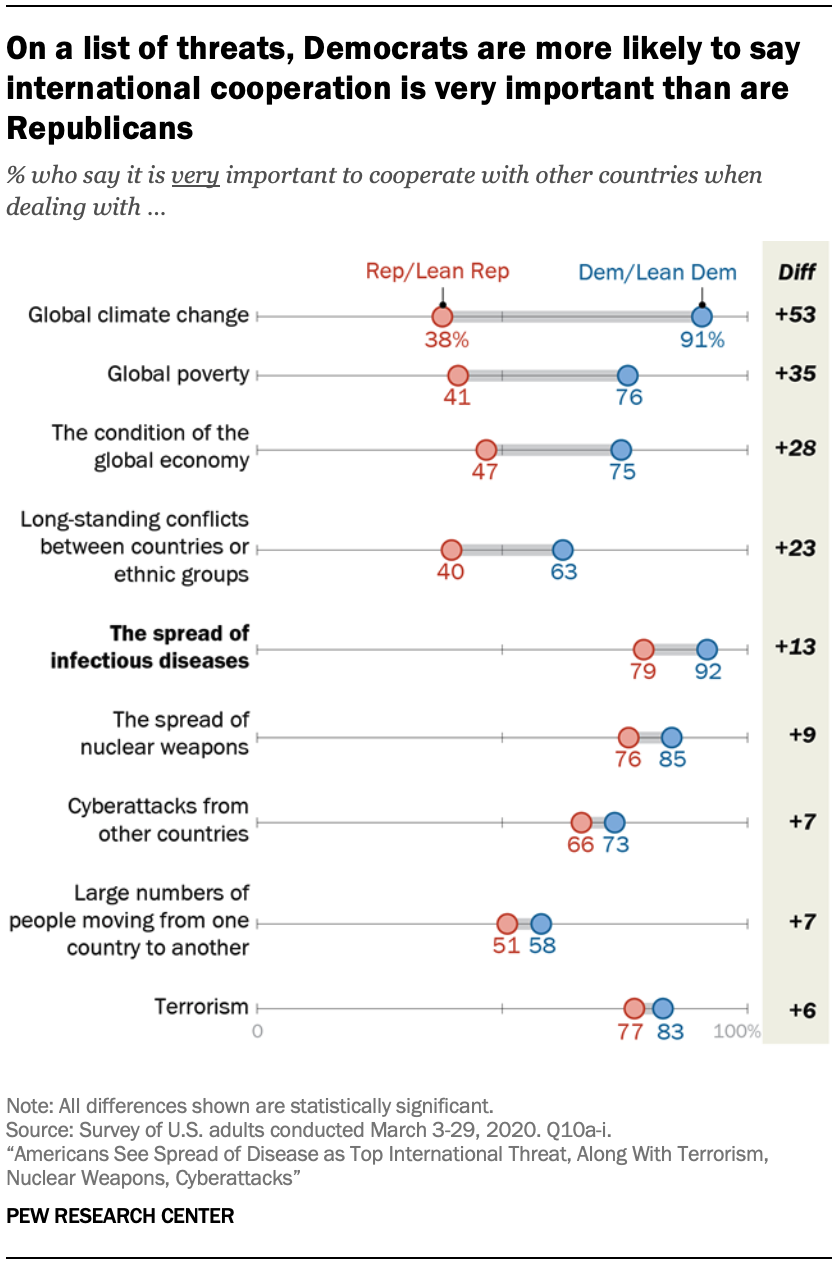
There are also partisan differences on whether cooperation is important in dealing with international threats. On each issue, Democrats are more likely than Republicans to say that cooperation with other countries is very important. The differences are especially large (over 20 percentage points) on global climate change, global poverty, the condition of the global economy and conflicts between other nations.
On the spread of infectious diseases, Democrats are also more likely than Republicans to say cooperation is very important, although partisan differences are not as stark as on climate change. Roughly nine-in-ten Democrats (92%) say cooperation with other countries is very important for dealing with the spread of disease, compared with 79% of Republicans.


